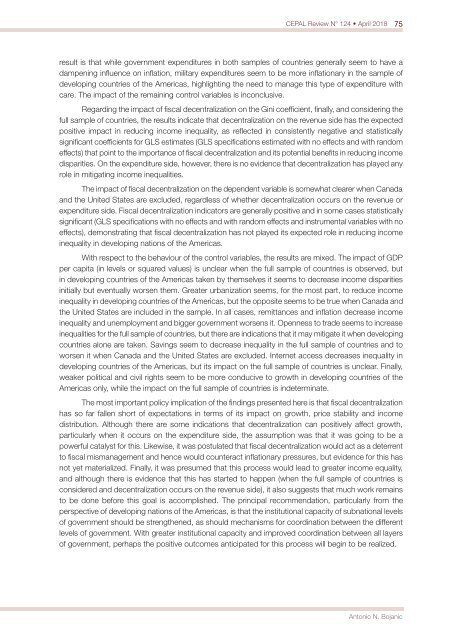CEPAL Review no. 124
April 2018
April 2018
Create successful ePaper yourself
Turn your PDF publications into a flip-book with our unique Google optimized e-Paper software.
<strong>CEPAL</strong> <strong>Review</strong> N° <strong>124</strong> • April 2018<br />
75<br />
result is that while government expenditures in both samples of countries generally seem to have a<br />
dampening influence on inflation, military expenditures seem to be more inflationary in the sample of<br />
developing countries of the Americas, highlighting the need to manage this type of expenditure with<br />
care. The impact of the remaining control variables is inconclusive.<br />
Regarding the impact of fiscal decentralization on the Gini coefficient, finally, and considering the<br />
full sample of countries, the results indicate that decentralization on the revenue side has the expected<br />
positive impact in reducing income inequality, as reflected in consistently negative and statistically<br />
significant coefficients for GLS estimates (GLS specifications estimated with <strong>no</strong> effects and with random<br />
effects) that point to the importance of fiscal decentralization and its potential benefits in reducing income<br />
disparities. On the expenditure side, however, there is <strong>no</strong> evidence that decentralization has played any<br />
role in mitigating income inequalities.<br />
The impact of fiscal decentralization on the dependent variable is somewhat clearer when Canada<br />
and the United States are excluded, regardless of whether decentralization occurs on the revenue or<br />
expenditure side. Fiscal decentralization indicators are generally positive and in some cases statistically<br />
significant (GLS specifications with <strong>no</strong> effects and with random effects and instrumental variables with <strong>no</strong><br />
effects), demonstrating that fiscal decentralization has <strong>no</strong>t played its expected role in reducing income<br />
inequality in developing nations of the Americas.<br />
With respect to the behaviour of the control variables, the results are mixed. The impact of GDP<br />
per capita (in levels or squared values) is unclear when the full sample of countries is observed, but<br />
in developing countries of the Americas taken by themselves it seems to decrease income disparities<br />
initially but eventually worsen them. Greater urbanization seems, for the most part, to reduce income<br />
inequality in developing countries of the Americas, but the opposite seems to be true when Canada and<br />
the United States are included in the sample. In all cases, remittances and inflation decrease income<br />
inequality and unemployment and bigger government worsens it. Openness to trade seems to increase<br />
inequalities for the full sample of countries, but there are indications that it may mitigate it when developing<br />
countries alone are taken. Savings seem to decrease inequality in the full sample of countries and to<br />
worsen it when Canada and the United States are excluded. Internet access decreases inequality in<br />
developing countries of the Americas, but its impact on the full sample of countries is unclear. Finally,<br />
weaker political and civil rights seem to be more conducive to growth in developing countries of the<br />
Americas only, while the impact on the full sample of countries is indeterminate.<br />
The most important policy implication of the findings presented here is that fiscal decentralization<br />
has so far fallen short of expectations in terms of its impact on growth, price stability and income<br />
distribution. Although there are some indications that decentralization can positively affect growth,<br />
particularly when it occurs on the expenditure side, the assumption was that it was going to be a<br />
powerful catalyst for this. Likewise, it was postulated that fiscal decentralization would act as a deterrent<br />
to fiscal mismanagement and hence would counteract inflationary pressures, but evidence for this has<br />
<strong>no</strong>t yet materialized. Finally, it was presumed that this process would lead to greater income equality,<br />
and although there is evidence that this has started to happen (when the full sample of countries is<br />
considered and decentralization occurs on the revenue side), it also suggests that much work remains<br />
to be done before this goal is accomplished. The principal recommendation, particularly from the<br />
perspective of developing nations of the Americas, is that the institutional capacity of subnational levels<br />
of government should be strengthened, as should mechanisms for coordination between the different<br />
levels of government. With greater institutional capacity and improved coordination between all layers<br />
of government, perhaps the positive outcomes anticipated for this process will begin to be realized.<br />
Antonio N. Bojanic


















